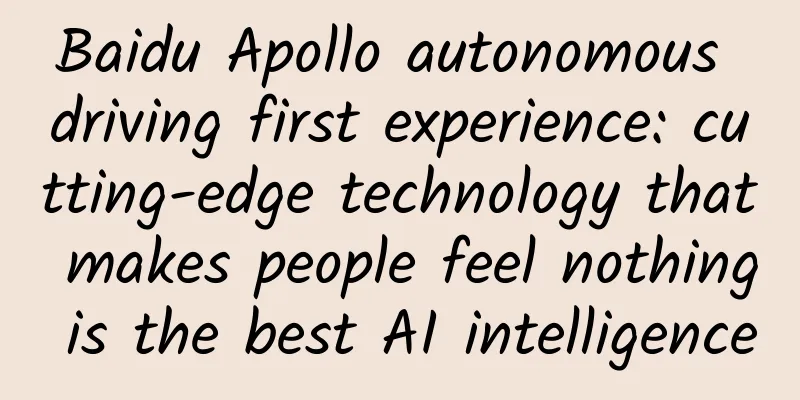Baidu Apollo autonomous driving first experience: cutting-edge technology that makes people feel nothing is the best AI intelligence

|
Baidu has accelerated the process of comprehensively promoting autonomous driving. In April this year, Baidu Apollo obtained a commercial operation license in Cangzhou, Hebei Province; on May 2, Apollo began regular operation in Beijing Shougang Park. During this period, it also obtained the first batch of night and special weather testing qualifications in China, and its operating hours in Beijing Yizhuang Economic and Technological Development Zone have been extended to 10 pm. This series of actions indicates that Baidu has already started the prelude to the large-scale commercialization of Apollo. But for consumers, autonomous driving still seems to be very far away from daily life and is a cutting-edge technology full of imagination and curiosity. Recently, at the invitation of Baidu, I came to Baidu Apollo Park in Beijing Yizhuang Economic and Technological Development Zone to experience the shared driverless car and feel this cutting-edge driverless technology that has always been around us. Before I start, let me tell you the results: Baidu Apollo is surprisingly stable, and from the passenger's perspective, it has reached the L4 level of autonomous driving standards. The model for this test ride experience is the Lincoln MKZ. This model has become one of the carriers commonly chosen by many companies when developing autonomous driving because of its relatively complete electrification structure and the interface it provides to developers of autonomous driving technology. From the appearance, the most striking feature of the Apollo shared driverless car is the laser radar protruding on the top. This radar, customized by Hesai Technology for Baidu Apollo, provides the vehicle with higher measurement accuracy. In addition, the vehicle is equipped with 2 millimeter-wave radars and 9 cameras. Through the combination of multiple detection methods, 360-degree perception information is achieved, providing all-round protection for the overall safety of the vehicle during driving. Inside the Apollo car, there is not much difference from ordinary cars, except for a few tablets that allow safety officers and passengers to check the driving status. For safety reasons, a safety officer is currently installed in the main driver's seat of each car to facilitate manual intervention in extremely special situations. Our experience journey officially began after clicking the button on the tablet. Throughout the journey, the car's speed was relatively conservative, which is completely understandable considering that it was on an open road in the city. From an intuitive point of view, the entire journey was very stable and smooth. Although there were no showmanship operations or scenes from some science fiction movies, the novelty brought by cutting-edge technology was still impressive. Excellent driving experience is the first element of a safe atmosphere. First of all, the car's start and brake are very smooth in control, without any abruptness, which can not only bring a better riding experience to passengers, but also enhance their sense of security - even if it is a real driver, if the start and brake are in a hurry, it will also make passengers have doubts about the safety of the trip. The second is its recognition of people, cars and obstacles around it. During the whole riding experience, I specifically compared the picture on the display screen in front of me with the situation outside the car window. It turned out that pedestrians, cars, bicycles and obstacles in all directions did not escape its "eyes", and it would display corresponding icons according to different environmental objects. The result of this precise identification is that Baidu Apollo can respond promptly and decisively when faced with scenes such as overtaking, turning, and avoiding pedestrians. Being responsible for the passengers in the car, as well as the pedestrians and vehicles outside the car, and ensuring the safety of both inside and outside the car is the basis for the large-scale implementation of autonomous driving technology. Finally, Baidu Apollo's nighttime driving capability. According to the safety officer on the vehicle, there is basically no difference between Baidu Apollo's nighttime and daytime driving experience. In the second half of the test and on the way back, it was already quite dark, but the car's driving was indeed not affected. You know, at night, dim light will make the images captured by the camera blurry, and complex road conditions will pose all-round challenges to the vehicle's perception, prediction, planning, control and other modules. Baidu Apollo's autonomous driving system has undergone targeted night driving scene training, so even in such a low-light environment, it is not afraid and can clearly identify pedestrians and obstacles within 200 meters. During the whole experience, the Apollo system only had one human intervention. Because the system was adjusted conservatively, it was more inclined to "give way" to other vehicles and pedestrians, so that more left-turning cars were waiting at a traffic light than usual. As a new driving technology, safety is definitely a priority, which is completely understandable. In addition, during the entire experience, Apollo did not encounter any accidents and was generally very satisfactory. This also made us believe that Baidu Apollo is ready to commercialize shared driverless cars. At least the technology is relatively mature. The next step is just iteration and larger-scale popularization. In addition, while exploring autonomous driving technology, Baidu is also making more efforts for vehicle-road collaboration, my country's intelligent transportation strategy. On May 13 this year, Baidu and Tsinghua University's Institute of Intelligent Industry jointly launched the Apollo Air project, which is the world's first and currently the only vehicle-road collaboration technology that uses pure roadside perception capabilities to truly achieve L4 autonomous driving closed loop on open road continuous road networks. This technology can synchronize road information for vehicles in real time in extremely dim light or bad weather, where the vehicle's line of sight is limited. It can also monitor vehicles, pedestrians or other obstacles in real time through roadside V2X equipment even when the vehicle's line of sight is obstructed, thereby reducing the incidence of traffic accidents. It can even enable vehicles with limited computing power and no on-board sensors to gain some autonomous driving capabilities, which is equivalent to enabling manned vehicles to achieve partial autonomous driving. To give the simplest example, on roads where this technology is used, even without the use of on-board sensors, traffic lights can be accurately identified, forming a "road command vehicle" situation. When Apollo Air becomes popular on most roads, the cost of each self-driving car will be greatly reduced, which will be a huge boost for Baidu and the entire self-driving industry. In order to make self-driving cars truly popular, in addition to reducing costs, they also need to gain consumer recognition. So, what kind of self-driving cars do consumers need? Frankly speaking, I was a little nervous before getting in the car, but after the experience, I felt very "unconscious" about the trip - if I hadn't noticed that the safety officer's hands were always off the steering wheel, I would have thought I was riding in an ordinary taxi - this just shows that Baidu Apollo has entered a fairly mature stage, and user "unconsciousness" is the only correct way for cutting-edge technology to integrate into real life. What would it take for a passenger to realize they were riding in a self-driving car? Could it be a crash into a guardrail? Could it be a hesitation about turning left or right at an intersection? Could it be an uncontrolled braking or acceleration? However, none of the above happened, which shows that Baidu Apollo's autonomous driving has been working stably and smoothly. Therefore, after the trip, I gave a thumbs up to this test ride from the bottom of my heart. Bluetooth headsets have been around for more than a decade, but it was not until the launch of AirPods in 2016 that they became truly successful in the market, because AirPods are almost the same as ordinary headsets except that they have no wires. Similarly, autonomous driving does not need to bring us a refreshing riding experience, but should be sufficiently hidden that people cannot perceive the difference from ordinary driving, so that the experience of autonomous driving and manned driving is the same. From this perspective, Baidu Apollo's performance is undoubtedly a groundbreaking progress in AI intelligence. As a winner of Toutiao's Qingyun Plan and Baijiahao's Bai+ Plan, the 2019 Baidu Digital Author of the Year, the Baijiahao's Most Popular Author in the Technology Field, the 2019 Sogou Technology and Culture Author, and the 2021 Baijiahao Quarterly Influential Creator, he has won many awards, including the 2013 Sohu Best Industry Media Person, the 2015 China New Media Entrepreneurship Competition Beijing Third Place, the 2015 Guangmang Experience Award, the 2015 China New Media Entrepreneurship Competition Finals Third Place, and the 2018 Baidu Dynamic Annual Powerful Celebrity. |
Recommend
The two major directions of planning are clear, and the dream of becoming a powerful automobile country has a ten-year plan
After more than a year, a major policy that draws...
In Antarctica, the Chinese scientific expedition team made their neighbors cry with envy
Question: In the icy Antarctic How many steps are...
A landslide occurred in Fugong, Yunnan! How to save yourself and others when encountering a landslide?
At around 4:50 am on March 18, a natural landslid...
Why is there always a gap under the door of a public toilet? The reason is...
During the May Day holiday, did you join the huge...
iOS source code download: scroll view of text + pictures
Functional classification: Other Supported platfo...
Sony developers' welfare Android M image released
The latest generation of Android M system release...
With a little resources, I want to do too many things!
When a company or team has more resources, they c...
KOL marketing skills!
KOL has undoubtedly transformed the entire market...
NetEase Tushou PK Yunji Weidian, which social e-commerce is better?
Recently I took over a distribution project, whic...
Dragon Tiger Chart Song God: Song God Main Promotion System Jacky Cheung Fifth Period
: : : : : : : : : : : : : : : : : : : : : : : : : ...
File transfer has been improved! Detailed experience of the new version of WeChat PC
With the arrival of WeChat 8.0.10 iOS version, We...
Why the stock price plummeted: Lenovo has fallen into the pain period of profit transformation
Recently, Lenovo released its interim financial r...
What to do if you accidentally lose your phone? It is crucial to do these things
Going out for a holiday, booking attractions, tak...
【Creative Cultivation Program】What does a person’s “blood type” actually mean?
Author: Li Jinghui (PhD student in Medical Experi...
5 ways to increase the weight of Tik Tok!
So the question is, how to improve the weight of ...









